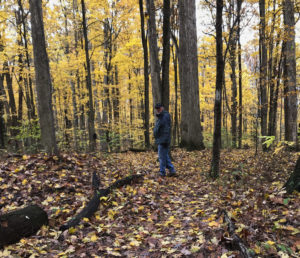by Dr. P. David Simcox
Let’s examine the issue of how our Governor Holcomb has disregarded concerns voiced by a multitude of citizens about the accelerated rate of logging in our State Forests. The Governor has chosen to rely upon his experts, Indiana DNR’s Division of Forestry, to decide the best policy to manage these Forests. In other words, he has exercised his responsibility to make policy by avoiding the issue.
Embedded in this policy is that the Division of Forestry staff believes all woodlands need human intervention to survive. Human intervention in this case means logging. It turns out–as the Governor knows–that there is a body of evidence about larger ecological issues expressed by scientists who offer opposing points of view.
The object of this discussion is not to debate the scientific arguments, but to point out that our Governor has chosen the riskiest approach to managing our resources for the future.
Science is Not Absolute
We have all seen reports of a new scientific study finding something you eat is bad for your health. Then a short time later another study says this same item is good for your health. ?Take chocolate or coffee for example. What you are hearing is that science is not absolute. There will be new research to be considered. There are always differing opinions that need to be incorporated into the body of evidence to support a scientific course of action.
Managing Global R&D Programs
In my career as a manager of global technology platforms in agriculture, pharmaceuticals and biotechnology, having a strategy incorporating differing points of view and technology was prudent. Portfolios were created that blended conservative projects and those with higher risk and those with proven technology with more cutting edge science. In no case did we ever bet on one horse. We sought a balanced R&D portfolio that offered opportunities but minimized the risk.
In reviews with scientists over the decades, I learned to appreciate the researchers who were open to varied explanations for their findings and then sought further investigation to select the right ones. Unfortunately, some scientists are there to sell you on their point of view, not to weigh the options.
Financial Portfolio
What would you do if your financial advisor says: “I found this great stock pick. Let?s take 97.5% of your retirement and invest it all there!” You would likely look for a new advisor. You would never want to take an irreversible or unrecoverable risk. You always seek a balanced investment portfolio spreading your risk and opportunity. It is all about risk management.
Opposing Points of View
IDNR’s current policy protects only 2.5% of our 158,000 acres of State Forests from logging. Even in the “old growth or older growth” sections of their Strategic Plan, they consider logging a management requirement.
Other Midwestern states, through policy or science, set aside significant portions of their state forests for no logging. No logging policies range from 100% in Illinois to 25% in Pennsylvania. Why does Indiana’s DNR think that is not a prudent approach? Do they know better? I have been told by a senior IDNR manager that Pennsylvania is just different with the only explanation given that it is larger. This outright dismissal should set off alarm bells.
Our Governor has rejected the advice of 228 Indiana scientists who see the current IDNR policy as ignoring the larger ecological picture. These forest ecosystems are complex and intricate. Concerns about the lack of knowledge about the forest soil ecosystems were recently expressed by a Professor Emeritus of Forestry from Purdue University. So much has yet to be learned about the impact of logging on these ecosystems.
Our IDNR is involved in a Hardwood Ecosystem Experiment study. This 100-year project is underway to determine how to best manage the forests. The operative word here is “experiment.” IDNR must be acknowledging they do not have all the answers…why otherwise would you call this an experiment?
In the meantime, while gathering the data, IDNR is ignoring opposing science and concerns and will continue to log all but minor tracts in our State Forests. There are many terms one might use to describe their approach, but “extremist? is a fair descriptor.
Other Governors Have Done Their Job
Past Indiana Governors have understood that our State Forests are precious resources and should be conservatively managed. Until 2002 and then with the subsequent hiring of a pro-logging head forester in 2005, Governors from both sides of the aisle have set aside as much as 40% of our State Forests from logging. This is not a resource for which one should take large risks.
Governor Holcomb is Gambling with Our Future
So instead of developing a policy that balances pro-logging and ecological concerns, Governor Holcomb has decided to push in all his chips and make the big bet. That is what our Governor is doing. Gambling with your and your grandchildren’s future: our natural heritage and the species that depend upon us.
Call Governor Holcomb and tell him he should have not picked just one stock; what we need is a balance in managing our State Forests.

